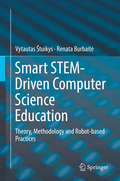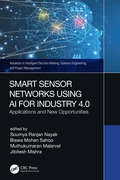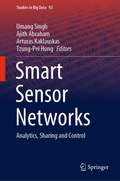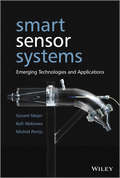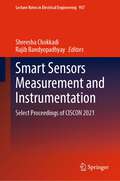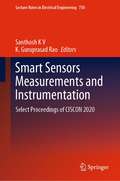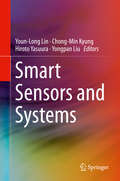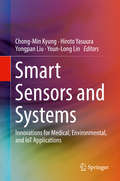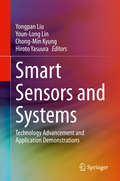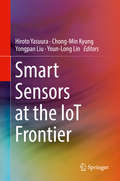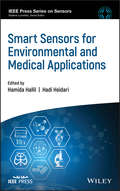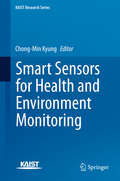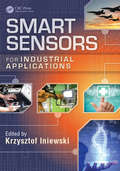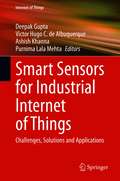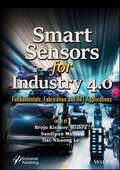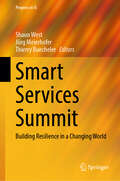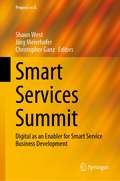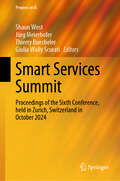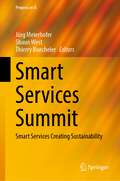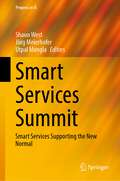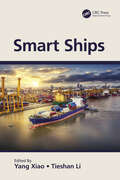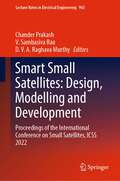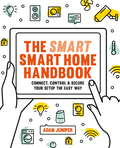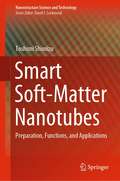- Table View
- List View
Smart STEM-Driven Computer Science Education: Theory, Methodology and Robot-based Practices
by Vytautas Štuikys Renata BurbaitėAt the centre of the methodology used in this book is STEM learning variability space that includes STEM pedagogical variability, learners’ social variability, technological variability, CS content variability and interaction variability. To design smart components, firstly, the STEM learning variability space is defined for each component separately, and then model-driven approaches are applied. The theoretical basis includes feature-based modelling and model transformations at the top specification level and heterogeneous meta-programming techniques at the implementation level.Practice includes multiple case studies oriented for solving the task prototypes, taken from the real world, by educational robots. These case studies illustrate the process of gaining interdisciplinary knowledge pieces identified as S-knowledge, T-knowledge, E-knowledge, M-knowledge or integrated STEM knowledge and evaluate smart components from the pedagogical and technological perspectives based on data gathered from one real teaching setting. Smart STEM-Driven Computer Science Education: Theory, Methodology and Robot-based Practices outlines the overall capabilities of the proposed approach and also points out the drawbacks from the viewpoint of different actors, i.e. researchers, designers, teachers and learners.
Smart Sensor Networks Using AI for Industry 4.0: Applications and New Opportunities (Advances in Intelligent Decision-Making, Systems Engineering, and Project Management)
by Muthukumaran Malarvel Soumya Ranjan Nayak Biswa Mohan Sahoo Jibitesh MishraSmart Sensor Networks (WSNs) using AI have left a mark on the lives of all by aiding in various sectors, such as manufacturing, education, healthcare, and monitoring of the environment and industries. This book covers recent AI applications and explores aspects of modern sensor technologies and the systems needed to operate them. The book reviews the fundamental concepts of gathering, processing, and analyzing different AI-based models and methods. It covers recent WSN techniques for the purpose of effective network management on par with the standards laid out by international organizations in related fields and focuses on both core concepts along with major applicational areas. The book will be used by technical developers, academicians, data sciences, industrial professionals, researchers, and students interested in the latest innovations on problem-oriented processing techniques in sensor networks using IoT and evolutionary computer applications for Industry 4.0.
Smart Sensor Networks: Analytics, Sharing and Control (Studies in Big Data #92)
by Ajith Abraham Tzung-Pei Hong Arturas Kaklauskas Umang SinghThis book provides IT professionals, educators, researchers, and students a compendium of knowledge on smart sensors and devices, types of sensors, data analysis and monitoring with the help of smart sensors, decision making, impact of machine learning algorithms, and artificial intelligence-related methodologies for data analysis and understanding of smart applications in networks. Smart sensor networks play an important role in the establishment of network devices which can easily interact with physical world through plethora of variety of sensors for collecting and monitoring the surrounding context and allowing environment information. Apart from military applications, smart sensor networks are used in many civilian applications nowadays and there is a need to manage high volume of demands in related applications. This book comprises of 9 chapters and presents a valuable insight on the original research and review articles on the latest achievements that contributes to the field of smart sensor networks and their usage in real-life applications like smart city, smart home, e-healthcare, smart social sensing networks, etc. Chapters illustrate technological advances and trends, examine research opportunities, highlight best practices and standards, and discuss applications and adoption. Some chapters also provide holistic and multiple perspectives while examining the impact of smart sensor networks and the role of data analytics, data sharing, and its control along with future prospects.
Smart Sensor Systems
by Michiel Pertijs Gerard Meijer Kofi MakinwaUses a multidisciplinary approach to review recent developments in the field of smart sensor systems, providing complete coverage of all important system and design aspects, their building blocks and methods of signal processing.The book systematically deals with topics over the whole range of sensor technology: from the theory and constraints of basic elements, the applied techniques and electronic, up to the level of application-orientated issues.It firstly looks at designing smart sensors and smart sensor systems, with measurement techniques at system level, such as collaboration and trimming, and impedance-measurement techniques. Sensing elements and sensor systems for the measurement of mechanical quantities, and microarrays for DNA detection are discussed in the opening chapters. Circuit design for sensor systems, such as the design of low-noise amplifiers, is covered in Chapter 6, and measurement techniques at device level, such as dynamic offset cancellation, are covered in Chapter 7. Optical imagers are examined in the next chapter. Lastly, the book takes a look at implantable smart sensors for bio-medical applications, then automotive sensors.Complements Smart Sensor Systems (2008) in both contents and scope. Where the first book offers an introduction and theory, this book goes further into the practical applicationsOffers a detailed coverage of sensor principles and characterization, measurement techniques and signal- and data processing techniques as applied in smart sensor systemsA wide range of application areas are included, such as automotive and biomedical, written by an internationally-recognized group of experts, many from industryA supplementary website hosts case studies and provides solutions to the problems in the bookEssential reading for Engineers and scientists involved in the design and application of sensor systems; research and development departments and laboratories of industrial companies, and other research institutes; product developers, industrial engineers, industrial set makers looking for innovative products.
Smart Sensors Measurement and Instrumentation: Select Proceedings of CISCON 2021 (Lecture Notes in Electrical Engineering #957)
by Shreesha Chokkadi Rajib BandyopadhyayThis book comprises the proceedings of the select peer-reviewed papers presented during the 18th Control Instrumentation System Conference (CISCON 2021). This book highlights the latest trends in instrumentation, sensors and systems, industrial automation and control, image and signal processing, robotics, renewable energy, power systems, and power drives. The research works covered in the book are of high quality and contributed by experts in academia and industry to provide meaningful direction for prolific growth. The book also features a few chapters contributed by the leading policymakers, technologists, farmers, and doctors who help outline the roadmap from the need for technology to policy-making to effect and implement technological advancements for the nation-building process. The book will serve as a valuable reference resource for academics and researchers across the globe.
Smart Sensors Measurements and Instrumentation: Select Proceedings of CISCON 2020 (Lecture Notes in Electrical Engineering #750)
by Santhosh K V K. Guruprasad RaoThis book presents the select proceedings of Control Instrumentation and System Conference, (CISCON 2020) held at Manipal Institute of Technology, MAHE, Manipal. It examines a wide spectrum covering the latest trends in the fields of instrumentation, sensors and systems, and industrial automation and control. The topics covered include image and signal processing, robotics, renewable energy, power systems and power drives, performance attributes of MEMS, multi-sensor data fusion, machine learning, optimization techniques, process control, safety monitoring, safety critical control, supervisory control, system modeling and virtual instrumentation. The book is a valuable reference for researchers and professionals interested in sensors, adaptive control, automation and control and allied fields.
Smart Sensors and Systems
by Chong-Min Kyung Youn-Long Lin Hiroto Yasuura Yongpan LiuThis book describes for readers technology used for effective sensing of our physical world and intelligent processing techniques for sensed information, which are essential to the success of the Internet of Things (IoTs). The authors provide a multidisciplinary view of sensor technology from MEMS, biological, chemical, and electrical domains and showcase smart sensor systems in real applications including smart home, transportation, medical, environmental, agricultural, etc. Unlike earlier books on sensors, this book provides a "global" view on smart sensors covering abstraction levels from device, circuit, systems, and algorithms.
Smart Sensors and Systems
by Chong-Min Kyung Youn-Long Lin Hiroto Yasuura Yongpan LiuThis book describes the technology used for effective sensing of our physical world and intelligent processing techniques for sensed information, which are essential to the success of Internet of Things (IoT). The authors provide a multidisciplinary view of sensor technology from materials, process, circuits, and big data domains and showcase smart sensor systems in real applications including smart home, transportation, medical, environmental, agricultural, etc. Unlike earlier books on sensors, this book provides a "global" view on smart sensors covering abstraction levels from device, circuit, systems, and algorithms.
Smart Sensors and Systems: Technology Advancement and Application Demonstrations
by Chong-Min Kyung Youn-Long Lin Hiroto Yasuura Yongpan LiuThis book describes for readers technology used for effective sensing of our physical world and intelligent processing techniques for sensed information, which are essential to the success of Internet of Things (IoTs). The authors provide a multidisciplinary view of sensor technology from materials, process, circuits, and big data domains and showcase smart sensor systems in real applications including smart home, transportation, medical, environmental, agricultural, etc. Unlike earlier books on sensors, this book will provide a “global” view on smart sensors covering abstraction levels from device, circuit, systems, and algorithms.Profiles active research on smart sensors based on CMOS microelectronics;Describes applications of sensors and sensor systems in cyber physical systems, the social information infrastructure in our modern world;Includes coverage of a variety of related information technologies supporting the application of sensors;Discusses the integration of computation, networking, actuation, databases, and various sensors, in order to embed smart sensor systems into actual social systems.
Smart Sensors at the IoT Frontier
by Chong-Min Kyung Youn-Long Lin Hiroto Yasuura Yongpan LiuThis book describes technology used for effective sensing of our physical world and intelligent processing techniques for sensed information, which are essential to the success of Internet of Things (IoT). The authors provide a multidisciplinary view of sensor technology from materials, process, circuits, to big data domains and they showcase smart sensor systems in real applications including smart home, transportation, medical, environmental, agricultural, etc. Unlike earlier books on sensors, this book provides a "global" view on smart sensors covering abstraction levels from device, circuit, systems, and algorithms.
Smart Sensors for Environmental and Medical Applications (IEEE Press Series on Sensors)
by Hadi Heidari Hamida HallilProvides an introduction to the topic of smart chemical sensors, along with an overview of the state of the art based on potential applications This book presents a comprehensive overview of chemical sensors, ranging from the choice of material to sensor validation, modeling, simulation, and manufacturing. It discusses the process of data collection by intelligent techniques such as deep learning, multivariate analysis, and others. It also incorporates different types of smart chemical sensors and discusses each under a common set of sub-sections so that readers can fully understand the advantages and disadvantages of the relevant transducers—depending on the design, transduction mode, and final applications. Smart Sensors for Environmental and Medical Applications covers all major aspects of the field of smart chemical sensors, including working principle and related theory, sensor materials, classification of respective transducer type, relevant fabrication processes, methods for data analysis, and suitable applications. Chapters address field effect transistors technologies for biological and chemical sensors, mammalian cell–based electrochemical sensors for label-free monitoring of analytes, electronic tongues, chemical sensors based on metal oxides, metal oxide (MOX) gas sensor electronic interfaces, and more. Addressing the limitations and challenges in obtaining state-of-the-art smart biochemical sensors, this book: Balances the fundamentals of sensor design, fabrication, characterization, and analysis with advanced methods Categorizes sensors into sub-types and describes their working, focusing on prominent applications Describes instrumentation and IoT networking methods of chemical transducers that can be used for inexpensive, accurate detection in commercialized smart chemical sensors Covers monitoring of food spoilage using polydiacetylene- and liposome-based sensors; smart and intelligent E-nose for sensitive and selective chemical sensing applications; odor sensing system; and microwave chemical sensors Smart Sensors for Environmental and Medical Applications is an important book for senior-level undergraduate and graduate students learning about this high-performance technology and its many applications. It will also inform practitioners and researchers involved in the creation and use of smart sensors.
Smart Sensors for Health and Environment Monitoring
by Chong-Min KyungThis book covers two most important applications of smart sensors, namely bio-health sensing and environmental monitoring. The approach taken is holistic and covers the complete scope of the subject matter from the principles of the sensing mechanism, through device physics, circuit and system implementation techniques, and energy issues to wireless connectivity solutions. It is written at a level suitable mainly for post-graduate level researchers interested in practical applications. The chapters are independent but complementary to each other, and the book works within the wider perspective of essential smart sensors for the Internet of Things (IoT). This is the second of three books based on the Integrated Smart Sensors research project, which describe the development of innovative devices, circuits, and system-level enabling technologies. The aim of the project was to develop common platforms on which various devices and sensors can be loaded, and to create systems offering significant improvements in information processing speed, energy usage, and size. This book contains substantial reference lists and over 150 figures, introducing the reader to the subject in a tutorial style whilst also addressing state-of-the-art research results, allowing it to be used as a guide for starting researchers.
Smart Sensors for Industrial Applications (Devices, Circuits, and Systems #14)
by Krzysztof IniewskiSensor technologies are a rapidly growing area of interest in science and product design, embracing developments in electronics, photonics, mechanics, chemistry, and biology. Their presence is widespread in everyday life, where they are used to sense sound, movement, and optical or magnetic signals. The demand for portable and lightweight sensors is relentless in several industries, from consumer electronics to biomedical engineering to the military. Smart Sensors for Industrial Applications brings together the latest research in smart sensors technology and exposes the reader to myriad applications that this technology has enabled. Organized into five parts, the book explores: Photonics and optoelectronics sensors, including developments in optical fibers, Brillouin detection, and Doppler effect analysis. Chapters also look at key applications such as oxygen detection, directional discrimination, and optical sensing. Infrared and thermal sensors, such as Bragg gratings, thin films, and microbolometers. Contributors also cover temperature measurements in industrial conditions, including sensing inside explosions. Magnetic and inductive sensors, including magnetometers, inductive coupling, and ferro-fluidics. The book also discusses magnetic field and inductive current measurements in various industrial conditions, such as on airplanes. Sound and ultrasound sensors, including underwater acoustic modem, vibrational spectroscopy, and photoacoustics. Piezoresistive, wireless, and electrical sensors, with applications in health monitoring, agrofood, and other industries. Featuring contributions by experts from around the world, this book offers a comprehensive review of the groundbreaking technologies and the latest applications and trends in the field of smart sensors.
Smart Sensors for Industrial Internet of Things: Challenges, Solutions and Applications (Internet of Things)
by Deepak Gupta Ashish Khanna Victor Hugo C. de Albuquerque Purnima Lala MehtaThis book brings together the latest research in smart sensors technology and exposes the reader to myriad industrial applications that this technology has enabled. The book emphasizes several topics in the area of smart sensors in industrial real-world applications. The contributions in this book give a broader view on the usage of smart sensor devices covering a wide range of interdisciplinary areas like Intelligent Transport Systems, Healthcare, Agriculture, Drone communications and Security.By presenting an insight into Smart Sensors for Industrial IoT, this book directs the readers to explore the utility and advancement in smart sensors and their applications into numerous research fields. Lastly, the book aims to reach through a mass number of industry experts, researchers, scientists, engineers, and practitioners and help them guide and evolve to advance research practices.
Smart Sensors for Industry 4.0: Fundamentals, Fabrication and IIoT Applications (Advances in Learning Analytics for Intelligent Cloud-IoT Systems)
by Dac-Nhuong Le Brojo Kishore Mishra Sandipan MallikDiscover the essential guide to harnessing the power of cutting-edge smart sensors in Industry 4.0, offering deep insights into fundamentals, fabrication techniques, and real-world IIoT applications, equipping you with the knowledge to revolutionize your industrial processes and stay ahead in the digital era. Over the last decade, technologies like the Internet of Things (IoT), big data, cloud computing, blockchain, artificial intelligence (AI), machine learning, device automation, smart sensors, etc., have become highly developed fundamental supports of Industry 4.0, replacing the conventional production systems with advanced methods, and thereby endorsing the smart industry vision. Industry 4.0 is more flexible and agile in dealing with several risk factors, further enabling improved productivity and efficiency, distribution, increased profitability, data integrity, and enhancing customer experience in the current commercial environment. For understanding and analyzing the environment, sensors play a major role in performing the measurements based on computation-produced results from the surrounding environment. Sensors have a wide range of applications for smart industrial operations. The evolution of flexible, low-cost, and multipurpose sensors and their system integration has been examined to develop advanced devices with applications in numerous fields of technology. With the development of both the Internet of Things (IoT) and the Industrial IoT (IIoT), advanced sensors and their associated applications are developing, resulting in the necessity for IoT sensors to be used for several industrial applications. Beneficial aspects of this book include: The latest research in materials and methodology for the fabrication of intelligent sensors, its IoT system integration, and IIoT applications are brought together; Promotes a vision towards making sensor-based monitoring and control of smart industry; Recent advances and challenges of smart sensors are discussed with an emphasis on unmet challenges and future directions of a roadmap to Industry 4.0. Audience This book is highly recommended to a wide range of researchers and industry engineers working in the area of fabrication and integration of industrial smart sensors for IIoT applications, advanced materials for sensor technology, fabrication and characterization of IoT sensors, development of low-cost sensors, sensor system design and integration, and its industrial applications. Post-graduate students from different streams like computer science, electronics and electrical engineering, information technology, electronic communication, etc. will benefit from reading this book.
Smart Services Summit: Building Resilience in a Changing World (Progress in IS)
by Shaun West Jürg Meierhofer Thierry BuechelerThis book presents up-to-date descriptions of Smart Services Innovations in industry, supported by new scientific approaches. It summarizes the outcomes of the fifth Smart Services Summit, held in Zurich in October 2023, which primarily focused on the ability of Smart Service Systems to support resilience and build sustainability. As the evolution of Smart Services accelerates, new technologies can be leveraged to create new value propositions and business models that deliver tangible sustainability outcomes. This book addresses social, economic, and environmental aspects of sustainability in connection with new technologies and includes papers on how these technologies can help achieve resilience and sustainability. In this context, topics such as sustainability and resilience in supply chains, X-as-a-Service, large language models for service automation, and location-based systems are discussed. Given its scope, the book represents an indispensable guide for practitioners and advanced students alike.
Smart Services Summit: Digital as an Enabler for Smart Service Business Development (Progress in IS)
by Shaun West Jürg Meierhofer Christopher GanzThis book offers state-of-the-art descriptions of intelligent service innovations in industry, supported by novel scientific approaches. It gathers findings presented at the 3rd Intelligent Services Summit, which took place in Zurich in September 2020, and chiefly focused on the design and application of Digital Twin as an enabler for business development in the field of smart services.Divided into three parts, the book addresses the challenges involved in the successful development and implementation of smart services for industry and science, ranging from data management to product design and lifecycle management. The four main aspects covered are industrial challenges, value system design (how to integrate resources into service ecosystems to create value), value creation through value proposition (how to create value for ecosystem actors), and value capture (how to create value for ecosystem businesses). Given its scope, the book offers an essential guide for practitioners and advanced students alike.
Smart Services Summit: Proceedings of the Sixth Conference, held in Zurich, Switzerland in October 2024 (Progress in IS)
by Shaun West Jürg Meierhofer Thierry Buecheler Giulia Wally ScuratiThis book presents up-to-date descriptions of smart service innovations in industry, supported by new scientific approaches. It summarizes the outcomes of the sixth Smart Services Summit, held in Zurich, Switzerland in October 2024, which primarily focused on digital co-creation in the smart services era and the transformative power of digital technologies and artificial intelligence in service ecosystems. The book explores the dynamics of value co-creation and examines how digital tools and artificial intelligence are enhancing interactions between service providers and consumers to innovate and improve service delivery. It covers a range of pertinent topics including the automation of customer engagement, the role of data analytics in understanding value perception, and the ethical considerations of AI in services. It also presents case studies that illustrate successful applications of AI in service design, offering readers a comprehensive view of how these technologies are fostering innovative co-creation practices. With contributions from leading academics and industry experts, this publication is essential for anyone interested in the future of service industries. It provides a scholarly yet accessible examination of how digital tools are not only reshaping service interactions but also establishing new paradigms for business and customer experiences in the digital age.
Smart Services Summit: Smart Services Creating Sustainability (Progress in IS)
by Shaun West Jürg Meierhofer Thierry BuechelerThis book presents up-to-date descriptions of smart services innovations in industry, supported by new scientific approaches. It summarizes the outcomes of the fourth Smart Services Summit, held in Zurich in October 2022, which primarily focused on how smart services can promote sustainability.As smart services accelerate, new technologies can be leveraged to create new value propositions and business models that deliver tangible sustainability outcomes. This book addresses social, economic and environmental aspects of sustainability in connection with new technologies. It includes contributions on how the quality and value of services are affected by digital technologies, how collaboration affects shared value creation, and how organizations can be enabled to drive digital value creation.Given its scope, the book represents an indispensable guide for practitioners and advanced students alike.
Smart Services Summit: Smart Services Supporting the New Normal (Progress in IS)
by Shaun West Jürg Meierhofer Utpal ManglaThis book provides state-of-the-art descriptions of smart service innovations in the industry, supported by novel scientific approaches. It gathers findings and insights presented at the fourth Smart Services Summit, held in Zurich, Switzerland, in October 2021, which primarily focused on how smart services have enabled companies to adapt during and to the COVID-19 pandemic.The book includes examples of remote and collaborative working that actively involve customers in service processes, requiring a change in mindset for more traditional firms. Moreover, it explores how services can be delivered faster and more affordable with the aid of new technologies and in collaboration with the customers, leading to new value propositions and business models and thus an evolution of smart services. Given its scope, the book offers an essential guide for practitioners and advanced students alike.
Smart Ships
by Yang Xiao Tieshan LiSmart shipping is a future method for transporting ocean cargo and exploring the resources of oceans for medical drugs, food, energy resources, and other products. A smart ship is an integration of shipping with many fields such as fishing, manufacturing, navigation, communication, computing, control, sensing, etc., to provide better shipping and services. The purpose of this edited book is to provide state‐of‐the‐art approaches and novel technologies for smart ships, covering a range of topics in these areas so that it will be an excellent reference book for the researchers, students, and professionals in these areas. It presents the fundamental technologies needed to build smart ships, and gives a clear explanation of them. This book will serve as a good reference for researchers to know the state of the art and to discover uncovered territory and develop new applications, as well as being a guideline for building future smart ships. Yang Xiao is a Full Professor in the Department of Computer Science at the University of Alabama, Tuscaloosa, Alabama, USA. Tieshan Li is a Full Professor in the School of Automation Engineering, University of Electronic Science and Technology of China, Chengdu, China.
Smart Small Satellites: Proceedings of the International Conference on Small Satellites, ICSS 2022 (Lecture Notes in Electrical Engineering #963)
by Chander Prakash V. Sambasiva Rao D. V. A. Raghava MurthyThis book comprises the select proceedings of the International Conference on Small Satellites and its Applications (ICSS) 2022. It aims to provide a comprehensive and broad-spectrum picture of the state-of-the-art research, development, and commercial perspective of various discoveries conducted in the real-world smart small satellites, applications and their services. The contents of this book focuses on efficient power management system, application-based optimum payload designs, telemetry and telecommand, advanced navigation and RF systems, flight and ground software’s, structure, mechanism and materials, space craft autonomy, quality, testing and reliability for designing the small satellites through advanced computational procedures for a variety of applications, etc. This book proves a valuable resource for those in academia and industry.
Smart Smart Home Handbook: Connect, control and secure your home the easy way
by Adam JuniperUntil just a few years ago, turning a light on and off with a clap was about as clever as technology got. Today, almost anything can be connected to the internet, and with this connection comes the ability to turn your bedroom lights off from another country, tell your thermostat to create a weather-appropriate lighting scheme, and answer the door without ever leaving your armchair.This book introduces you to Alexa, Siri, and every major technology competing to smarten your home and improve your life. You'll learn how to choose between them, how to optimize their function, and how to avoid the pitfalls that cause new adopters to wish they'd never let a computer into their home.
Smart Smart Home Handbook: Connect, control and secure your home the easy way
by Adam JuniperUntil just a few years ago, turning a light on and off with a clap was about as clever as technology got. Today, almost anything can be connected to the internet, and with this connection comes the ability to turn your bedroom lights off from another country, tell your thermostat to create a weather-appropriate lighting scheme, and answer the door without ever leaving your armchair.This book introduces you to Alexa, Siri, and every major technology competing to smarten your home and improve your life. You'll learn how to choose between them, how to optimize their function, and how to avoid the pitfalls that cause new adopters to wish they'd never let a computer into their home.
Smart Soft-Matter Nanotubes: Preparation, Functions, and Applications (Nanostructure Science and Technology)
by Toshimi ShimizuThis book addresses the manufacturing methods, characteristic tubular morphologies, diverse functions, and potent applications of organic tubular architectures prepared or self-assembled from rationally designed molecular building blocks. The hollow cylindrical structures with high-aspect ratios are capable of creating unique functions that can be differentiated from well-known self-assembled nanostructures such as organic nanofibers, nanoribbons, and nanorods. Encapsulation, stabilization, transportation, release, and their cooperative functions pave the way for innovative chemical, physical, biological, and medical applications. The book presents attractive advantages of soft-matter nanotubes, which are also different from well-known hard-matter nanostructures such as carbon nanotubes. The topics and figures in this volume intrigue not only academic researchers but also engineers and university students.
